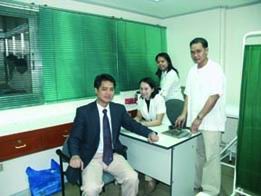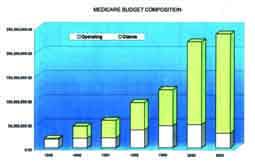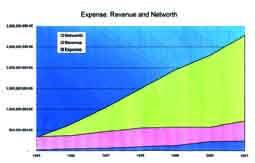| |
| |
| ----------------------------- |
|
|
|
| |
| health |
| |
| PhilHealth
taking over OWWA Medicare |
| Last
Nov. 6, the Overseas Workers Welfare Administration (OWWA)
launched its outpatient clinic at the lobby of the Philippine
Overseas Employment Adminis-tration (POEA) building in
Mandaluyong City. The clinic, which is the second of its
kind, is OWWA’s way of enhancing its health care
services for OFWs and their dependents. It is also OWWA’s
pamasko for OFWs. |
OWWA
Deputy Administrator and Medicare Manager Delmer
R. Cruz, who led the launching ceremony, also disclosed
that the agency would open up similar clinics in
Cebu and Davao in January 2003. But sooner or later,
these clinics may no longer be under OWWA but under
the Philippine Health Insurance Corp. (PhilHealth),
a government corporation administering the government’s
medical care program for all Filipinos. PhilHealth
is taking over the function of providing health
and medical service to OFWs from OWWA by virtue
of its mandate. But OWWA wants to keep the function.
“We made a comparative
matrix of the package of benefits under PhilHealth
and OWWA Medicare.
|
|
 |
| OWWA
Deputy Administrator and Medicare Manager Delmer
R. Cruz samples the service of Dr. Remy Magno-Tahil,
head of the OWWA outpatient clinic at the lobby
of the POEA headquarters. MedTech Elma Ligason and
RadTech Vic Jumarang look on. |
| |
|
The matrix
indicated that mas superior ang package of benefits and
services ng OWWA Medicare,” said Cruz, citing one
of the reasons OFW Medicare should be retained under OWWA.
Cruz cited other advantages of the OWWA Medicare.
Members of the OWWA Medicare and
their dependents may start availing of health and medical
benefits immediately after paying the P900 annual premium.
In contrast, availing PhilHealth
benefits is subject to a three-month waiting period. PhilHealth
members pay three regular monthly premiums of P100 within
six months prior to availment of benefits. The annual
premium in PhilHealth is P1,200 or P300 per quarter
OWWA Medicare also gives a 200%
increase in benefits for catastrophic cases such as injury
from accident and sickness.
Aside from superior benefits and services, Cruz noted
that with the presence of OWWA in countries where there
is a heavy concentration of OFWs, collection of membership
contributions and availments of medical benefits can be
done with dispatch. OWWA’s computer system, which
is already in place, facilitates the provision of Medicare
services to OFWs.
PhilHealth had invoked its mandate
under Republic Act 7875 or the National Health Insurance
Act of 1995 to justify its takeover of the OWWA Medicare.
RA 7875 provides for universal and compulsory health insurance
coverage of all Filipinos.
“Tama ‘yon, dapat
ma-cover lahat ng Pilipino. Pero di nangangahulugan na
isang entity lang ang magko-cover. Pwedeng ibang agency,”
Cruz said.
It is also OWWA’s position
that PhilHealth covers only indigent Filipinos or those
who cannot afford such health services.
Cruz added that RA 7875 has not expressly repealed Executive
Order 95, which creates the OWWA Medicare and authorizes
OWWA to collect, administer and disburse the funds of
its Medical Care Program for OFWs and their dependents.
In its position paper recommending
the retention by OWWA of the administration of the Medical
Care Program Fund for OFWs, the agency cited that RA 7875
and EO 95 are not inconsistent with each other and can
co-exist together.
OWWA added that RA 7875 did not
expressly provide for the transfer of the Medical Care
Program Fund for OFWs to PhilHealth.
For its part, PhilHealth promised OFWs and their dependents
that they will enjoy the same Medicare benefits as what
they are currently getting from OWWA after the transfer.
“Nananawagan kami sa mga
OFW na wala silang dapat ipangamba. Sisiguraduhin namin
sa PhilHealth na ang mga natatangagap nila sa OWWA ay
pareho din na matatanggap nila sa PhilHealth,” declared
Dr. Francisco T. Duque III, president and CEO of PhilHealth,
over the radio program Radyo OFW aired over DZMM every
Sunday.
“We will maintain the current
hospitalization and out-patient benefits that OFWs are
currently enjoying under OWWA, including the contribution
rate,” said Duque.
He also cited an advantage of
PhilHealth over OWWA Medicare.
“Ang lamang namin sa OWWA Medicare ay ang mga OFW
na naging member ng PhilHealth, pag naabot nila ang retirement
age, magiging lifetime member sila. Di na nila kailangang
magbayad pa pero tuloy-tuloy ang kanilang benepisyo,”
Duque told Radyo OFW host Rod Hizon.
Under PhilHealth rules, any OFWs
who retire at the age of 60 and have 120 monthly contributions
can qualify under PhilHealth’s Non-Paying Program
and enjoy Medicare benefits for life without having to
pay any contribution.
The earlier an OFW becomes a member
of PhilHealth, the more they are assured of qualifying
in the non-paying program, said Duque.
OFWs who eventually return for good in the country can
continue their Medicare coverage through PhilHealth’s
Individually Paying Program.
While it may not have offices
abroad, PhilHealth has 16 regional offices and 71 service
offices nationwide with 1,512 accredited hospitals, 289
rural health units and 17,555 doctors all over the Philippines.
As of September 30, 2002, PhilHealth
covers at least 40 million beneficiaries, six million
of whom are individual payees. Some 20 million are workers,
five million are indigents and almost 30,000 are non-paying
members.
Duque assured that PhilHealth
would properly main tain the P3 billion worth of Medicare
contributions of OFWs to OWWA.
“Maganda ang aming pamamalakad sa PhilHealth. Ang
President ng Pilipinas mismo ang nagsasabi na isa sa mga
top performing agencies ang PhilHealth sa taong ito. Maganda
ang aming ginagawa,” he said.
“Di namin papayagan na magamit ang pondo ng PhilHealth
sa iba. Hahanap pa tayo ng paraan para mas mapaganda ang
serbiosyo natin sa mga OFWs,” he added.
Congress wants to make sure that
the transfer of the OWWA Medicare to PhilHealth will be
for the best interest of OFWs. Sen. Loren Legarda Leviste,
the Senate Committee on Labor had set an inquiry on the
transfer after OWWA said such move would be detrimental
to the welfare of OFWs.
While the Senate may have a say
on the issue, an OWWA official believes that the President
can have her way by just signing an order. But if there
is anyone who must decide on this matter, it should be
the OFWs themselves because it is their money anyway.
|
| |
| Sound
fund
OWWA Medicare Manager
Delmer R. Cruz said that the OWWA Medicare finances
stand on very solid footing. “It can even
further enhance the Medicare package for OFWs,”
he said.
The fund’s projected
net worth by yearend of 2002 is approximately
P3 billion, proof that the money is in good hands
under OWWA.
The accumulated fund balance
within a span of only seven years was brought
about by the sustained high revenue generation
capacity of the system. Revenues generated by
the Medical Program increased from P339.87 million
in 1995 to P714.56 million in 2001 posting an
average annual increase of 18%.
The OWWA Medicare revenue
exhibited an increasing trend from 1995 to 1998,
remained relatively stable for the next two years
and bounced back in
|
|
 |
|
 |
|
| |
|
|
2001 attaining
the highest annual increase of 25.6 %. The total revenue
generated amounted to P3.57 billion in seven years or
average annual revenue of P509.89 million.
The collected premiums accounted
for 72% of rev enue while investment income contributed
28%.
The total expenses increased from
P19.85 million in 1995 to P261.01 million in 2001 or an
average annual expenditure of P117.17 million. About 70%
of the total expenses went to direct benefits and services
to members. This percentage accounted for only 23% of
the total revenue generated.
The efficiency of the OWWA Medicare
program operation is clearly shown by the small proportion
(7%) of the operating costs to revenue generated. |
| |
|
|
|
|
|
|
|
|
|
|
|
|
|
|


